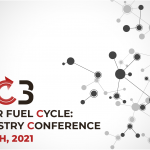Context of the project
Nuclear power plays an essential role in limiting the EU’s greenhouse gas emissions, and contributes significantly to improving the EU’s independence, security and diversity of energy supply.
However, nuclear energy remains controversial in the EU energy dialogue, mainly due to:
- its low efficiency in terms of the amount of uranium mined versus the amount of uranium actually consumed in an open fuel cycle
- its social acceptance which is inextricably linked to enhanced safety management, including the safe management of long-lived radioactive waste
The fuel cycle can be closed by recovering the plutonium from the spent nuclear fuel made up of uranium oxide (UOX) and recycling it into Mixed Oxide (MOX) fuel. This process, which is already implemented today in some light water reactors (LWR) in France, improves the efficiency of uranium by about 20%. As MOX can substitute for fresh UOX, it also cuts down on uranium needs at the front end of the fuel cycle, thus reducing the environmental impact of nuclear energy – the front end being the main contributor to most environmental indicators.
Finally, this recycling process reduces the amount of high level waste (i.e. spent reactor fuel or waste materials remaining after the spent fuel is reprocessed) to dispose of by a factor of 4, which eases its interim storage and reduces the volume needed in the final waste repository by a factor of 4 as well.
Background information
About GENIORS
Impacts and objectives
The international and European setting
Results
Boosting efficiency and sustainability with future Generation IV reactors…
Although this closed fuel cycle significantly increases the sustainability of nuclear energy, major improvements can still be made.
Natural uranium consists largely of two isotopes: 0.7% of uranium-235 and 99.3% of uranium-238. Energy produced in current nuclear reactors results from the splitting of the uranium-235 atoms, a process which releases energy in the form of heat. The remaining 99.3%, uranium-238, does not contribute directly to this process.
The fourth generation of reactors (GEN IV), which are expected to enter operation by 2030, could allow a breakthrough in the use of uranium by increasing its efficiency up to 100% in theory, as they can also split uranium-238 atoms and allow multiple recycling of plutonium.
Recycling actinides to reduce volume and radiotoxicity of waste…
While GEN IV reactors provide a solution for using the world’s uranium resources much more efficiently, waste is still generated and its high radiotoxicity is not reduced. Indeed, MOX fuel contains the minor actinides neptunium, americium and curium which are highly radioactive elements produced in reactors.
This issue can only be addressed through the recycling of these elements. At this stage, Partitioning and Transmutation (P&T) operations can reduce the life expectancy of these minor actinides, dividing them into other elements (fission) with a shorter life-cycle. Several recycling options are proposed today which bring the nuclear waste life to a human scale and reduce the volume of the waste by 90%.




